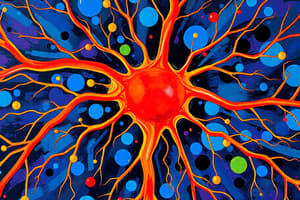Podcast
Questions and Answers
What is a reflex in biology?
What is a reflex in biology?
A reflex in biology is an involuntary, unplanned sequence or action and nearly instantaneous response to a stimulus.
How are reflexes initiated?
How are reflexes initiated?
Reflexes are initiated by a stimulus that initiates a neural signal, which is carried to a synapse.
What are reflex arcs?
What are reflex arcs?
Reflex arcs are neural pathways in the nervous system through which a reflex occurs.
Do all reflexes require conscious thought?
Do all reflexes require conscious thought?
Give an example of a reflex that increases organism survival.
Give an example of a reflex that increases organism survival.
Which type of reflex has a single synapse?
Which type of reflex has a single synapse?
What is the purpose of the feline righting reflex?
What is the purpose of the feline righting reflex?
What are reflex arcs?
What are reflex arcs?
What is the function of a reflex in biology?
What is the function of a reflex in biology?
How are reflexes initiated?
How are reflexes initiated?
Flashcards are hidden until you start studying
Study Notes
Reflexes in Biology
- A reflex is an involuntary, unplanned sequence or action and nearly instantaneous response to a stimulus.
- Reflexes are found in organisms with a nervous system, with varying levels of complexity.
- Reflexes occur via neural pathways in the nervous system called reflex arcs.
Reflex Arcs
- A stimulus initiates a neural signal, which is carried to a synapse.
- The signal is then transferred across the synapse to a motor neuron, which evokes a target response.
- Neural signals do not always travel to the brain, allowing many reflexes to be automatic responses to a stimulus without conscious thought.
Types of Reflexes
- Many reflexes are fine-tuned to increase organism survival and self-defense.
- Examples of reflexes include the startle reflex, which provides an automatic response to an unexpected stimulus.
- The feline righting reflex reorients a cat's body when falling to ensure safe landing.
Short-Latency Reflex
- A short-latency reflex is the simplest type of reflex.
- It has a single synapse.
Studying That Suits You
Use AI to generate personalized quizzes and flashcards to suit your learning preferences.



